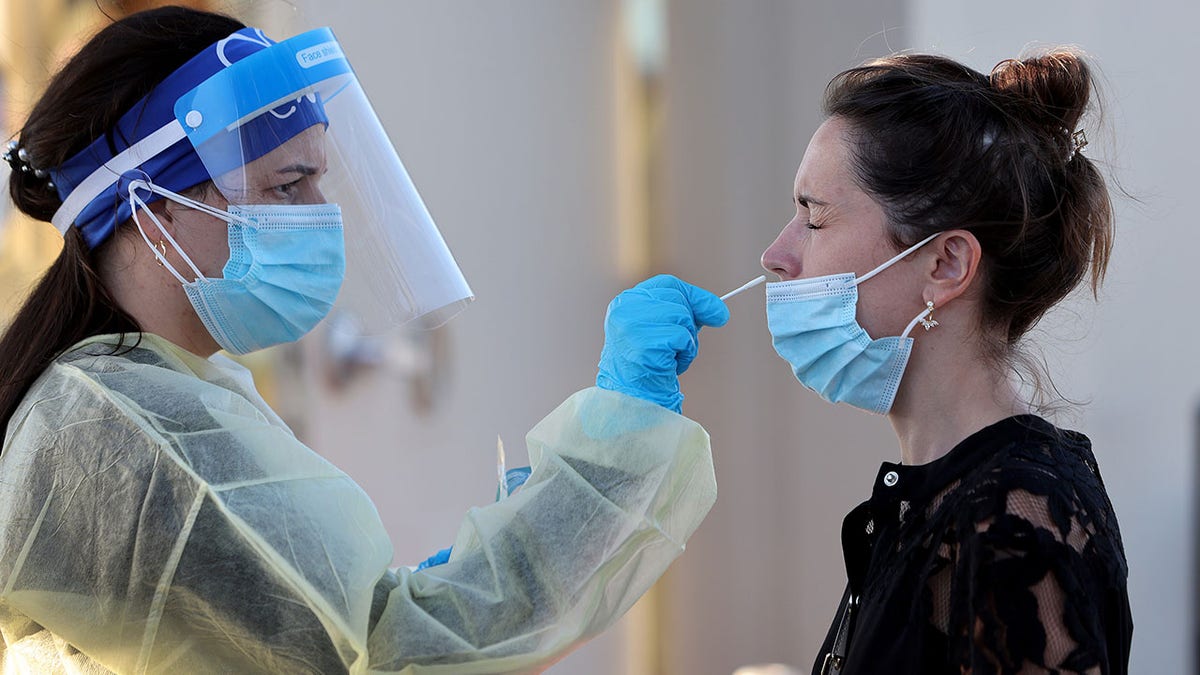What is the new XBB.1.5 COVID variant?
Fox News medical contributor Dr. Janette Nesheiwat weighs in on the rise in cases of the new COVID variant heading into 2023 on 'Fox News Live.'
COVID-19 hospitalizations and deaths could see an increase this month, according to new data from the Centers for Disease Control and Prevention (CDC).
The CDC's COVID data tracker recently revealed that hospitalizations have been on the rise since November 2022.
In the last week, hospitalization rates have increased by 17% among all age groups with confirmed COVID cases.
The CDC added an update to its website on Thursday, detailing ensemble forecasts for the next four weeks.
Ensemble forecasts on state and territory levels predict the number of daily confirmed COVID-19 hospital admissions — and the latest data reveals the number will most likely increase in eight jurisdictions.

A doctor checks on a COVID-19 patient at Providence Cedars-Sinai Tarzana Medical Center in Tarzana, California, on Sept. 2, 2021. (APU GOMES/AFP via Getty Images)
This week’s national ensemble predicted that the number of hospital admissions will remain stable or have an uncertain trend.
THE NEW OMICRON SUBVARIANT XBB.1.5: WHAT YOU MUST KNOW NOW
This could include 2,400 to 13,200 new confirmed admissions likely reported on Jan. 27, 2023.
The national ensemble also predicted that the total number of COVID-19 deaths in the U.S. could hit 1,113,000 by Jan. 28, 2023.

A patient gets a COVID-19 test done by a health care worker on Jan. 13, 2022, in North Miami, Florida. (Joe Raedle/Getty Images)
The number of total deaths is currently 1,088,481.
Fox News medical contributor and NYU Langone professor of medicine Dr. Marc Siegel shared with Fox News Digital that these numbers are "something to be concerned about."
The New York City-based doctor connected the growing numbers with the new omicron subvariants XBB and XBB.1.5, since they're "clearly spreading more easily."
Even though the variant is more immuno-evasive, Siegel said a recent vaccine booster will still decrease the severity of the health impacts of the subvariants.
![Medical professionals recommend keeping up with vaccinations. "Now is the time to get one if you haven't been vaccinated or had COVID in [the] past 3-6 months depending somewhat on your risk factors," said Dr. Marc Siegel.](https://a57.foxnews.com/static.foxnews.com/foxnews.com/content/uploads/2021/02/1200/675/c4b8ed8e-istock_vaccine.jpg?ve=1&tl=1)
Medical professionals recommend keeping up with vaccinations. "Now is the time to get one if you haven't been vaccinated or had COVID in [the] past 3-6 months depending somewhat on your risk factors," said Dr. Marc Siegel. (iStock)
"Now is the time to get one if you haven't been vaccinated or had COVID in [the] past 3-6 months depending somewhat on your risk factors," he said.
"But I would suggest [it] for most adults at least."
Siegel also suggested Paxlovid as an effective treatment in some cases, under a doctor's guidance.
CLICK HERE TO SIGN UP FOR OUR HEALTH NEWSLETTER
The CDC said that while ensemble forecasts combine diverse independent team predictions into one — and are considered reliable — they shouldn’t be relied upon for decision-making about the possibility or timing of trends.
CLICK HERE TO GET THE FOX NEWS APP
Also, other medical experts suggest that holiday-timed travel, social get-togethers and other factors may be contributing to the rising hospitalization rates.










































